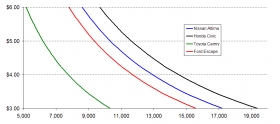AskPablo: Should I buy a hybrid?

Source: Triple Pundit
This week a frequent reader presented me with a common dilemma. "Does the fuel economy improvement of a hybrid really justify paying the price premium?" I'll take a look at several different car models that are available in both hybrid and standard versions in order to come up with an answer.
I began by researching the prices and fuel economy of five hybrid vehicles and their non-hybrid counterparts: Ford Escape, Honda Civic, Nissan Altima, Saturn Aura, and the Toyota Camry. The Saturn Aura Hybrid is not priced much higher than the standard model but some research showed that this vehicle is a bit of a joke in the hybrid vehicle world. It's mpg increase is not impressive, the electric motor is weak, and the vehicle can apparently only run in fully electric mode up to 3 miles per hour. For these reasons I have excluded the Saturn Auro from the results. The Toyota Prius is also notably absent, a decision made due to the fact that the Prius is a hybrid specific vehicle and there is no non-hybrid baseline vehicle to compare it to.
I gathered the city and highway mpg data for all four cars, both hybrid and non-hybrid. I averaged the numbers for each and compared the hybrid and the baseline models. Next I compared the price difference, which averaged to $4,662, the so-called "hybrid premium." But the average fuel economy improvement over the non-hybrid model was 10 mpg. This comes out to a average surcharge of $466 per additional mpg. Keep in mind that keeping your tires inflated, driving less aggressively, slowing down, and keeping your vehicle maintained can all result in >1 mpg savings as well, but for FREE.
To look at the fuel economy improvement in terms of a payback period is difficult since vehicle usage varies widely from several thousand miles per year to 20,000+ miles per year. The cost of fuel is also constantly in flux and the future price is quite uncertain (the only thing that is certain is that it will go up). I have prepared a chart for these four vehicles that shows the payback distance, in terms of miles, based on the average price of fuel. So, a person buying the Honda Civic Hybrid would need to drive 16,594 miles before he/she would begin to realize savings from their purchase (assuming current fuel costs of around $3.50/gallon).

If you want to factor in the cost to society, like the climate impact, the health impact, or the cost of going to war for oil then simply add that amount to today's price of gasoline. So if you assume that the true cost of gasoline is closer to $6.00/gallon, the same driver would need to drive only 9,680 miles to justify the vehicle purchase to his or her great-grandchildren.
Now, to put this all into terms of a payback period, we just need to take into account our driver's driving habits. If the driver travels 17,000 miles per year then the payback period of the hybrid surcharge would be less than a year! If the driver prefers public transit and only uses his vehicle 5,000 miles per year the payback period would be just over 3 years. Even in this case, this represents a return on investment of over 30% (100%/3). Try getting that sort of risk-free return from a bank!
Additional factors that were not included are tax incentives of around $2000 and the planet-saving (or at least less-damaging) über-cool factor.